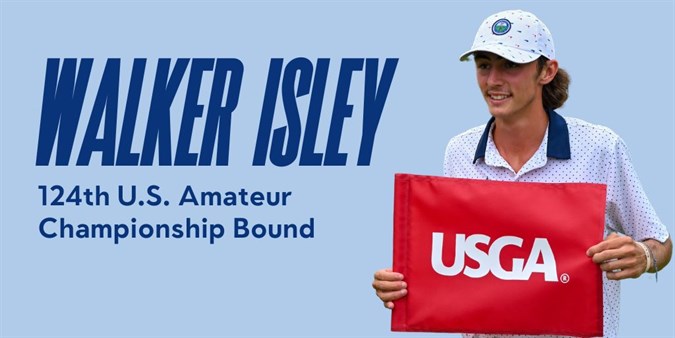From the CGA to the 124th U.S. Amateur Championship

Oak Island Golf Club is more than just a course to Walker Isley — it’s home.
Living 600 yards from the ocean on one side and the clubhouse on the other, golf became intertwined in Isley’s daily routine from a young age.
His father, Steve Isley, works as Oak Island’s head golf professional and as a kid, Walker could head out on the course most days after school.
“I probably wouldn’t play golf if it weren’t for him,” Walker said.
Oak Island is in Caswell Beach, N.C. in what Steve calls “more of a tourist spot.” The kids visiting preferred playing other sports like baseball and football so Isley learned the game with older people.
“Once he turned about 12, 13, 14, nobody else could beat him around here,” Steve said.
Walker is a competitor. It always fueled his drive to get better — and to beat those Oak Island members.
Now, at 22, he’s about to play in his third U.S. Amateur Championship.
In June, Isley successfully defended his North Carolina Amateur Championship title shooting scores of 70-63-64-62, finishing at 25-under, 15 shots better than the rest of the field.
“I know how good a lot of those players are and they have whooped my tail plenty of times, but it just assures me that, you know, I’m doing the right things and I just need to keep that up,” Isley said.
For the first time, the USGA now offers exemptions to winners of state championships in the U.S. Amateur as opposed to playing in traditional qualifiers, ensuring the best players from every state are included in the field.
“We can identify the best players playing in state championships because they typically end up being 54 to 72 holes,” Tyler Riggin, a USGA Regional Affairs Director, said. “The best players tend to be the cream that rises as opposed to playing an 18 hole qualifier at the local level.”
In 2022, Isley made the cut and advanced to the match play portion of the tournament, but last year at Cherry Hill he didn’t make the top 64. Prior to winning the N.C. Amateur, he wasn’t planning on trying to qualify for Hazeltine, but now that he has, he’s excited for the opportunity.
“I think just trying to play smart enough and aggressive enough to get into match play and then it’s a free run from there,” Isley said. “Everybody’s got a good chance if they make it to match play.”
Steve saw a shift in his son’s game at Croasdaile Country Club. Finishing out his college career at UNCW, he said Walker didn’t play at his best, “but he was right there.”
“I think he knew he was getting ready to turn pro and that just motivated him to know he’s going to have to tighten up, and he did,” Steve said. “It was those four rounds I watched him; he’s had that in him all along.”
On the course, Walker gets into a rhythm that’s quicker than most. It doesn’t allow time for overthinking, or doubt, just enough time to hit the shot and move on. Rather than getting caught up in a tedious pre-shot routine, Walker just sticks to basics.
“The people I grew up playing with always just grabbed a club and whacked it,” Isley said. “I mean, I think about how far I’m gonna hit and stuff but you just get up there and hit it.”
Golf has always been fun for Isley; if that’s ever not the case, he said he would probably quit.
“Once I kind of realized, you know, we’re out here to have fun and there are bigger things in life than hitting a ball straight, I think I got a lot better,” Isley said.
Walker’s never been the player anyone’s ever needed to tell to go practice. Even 600 yards from the beach and an avid surfer, he’s always made time to travel those 600 yards in the opposite direction to the course.
“You know, you see guys that might beat you in the tournament, and I don’t want him to beat me anymore, so you just try to get better, better, better,” Steve said. “And mentally, Walker wants to win — he knows you’re not going to win by not sharpening your game up.”
Golf will soon become Walker’s career as he’s turning professional following his appearance in the 124th U.S. Amateur Championship.
“I’ve, in my mind, had no doubt,” Steve said. “He’s always had the ability and the talent.”
About the Carolinas Golf Association (CGA)
The CGA is a 501(c)(3) not-for-profit educational organization founded in 1909 to promote and protect the game of golf in the Carolinas by providing competitions, education, support, and benefits to golf clubs and golfers. The CGA is one of the largest golf associations in the country, with over 700 member clubs represented by over 200,000 individuals.
The CGA annually conducts 48 championships and five team match competitions for men, women, juniors, and seniors. It also runs over 150 One-Day (net and gross) events and qualifying for USGA national championships. The CGA serves golf in the Carolinas with numerous programs such as: the USGA Handicap System; tournament management software and support; course measuring and course/slope ratings; agronomy consultation; answers about the Rules of Golf, Rules of Amateur Status, and Handicapping; Carolinas Golf Magazine; Interclub series; Tarheel Youth Golf Association; Carolinas Golf Hall of Fame; expense assistance for USGA Junior and Girls' Junior qualifiers from the Carolinas; and the Carolinas Golf Foundation (CGF). The CGF has distributed over $3,000,000 since 1977 to benefit Carolinas' golf initiatives, including junior, women and adaptive programs.
For more information about the Carolinas Golf Association, follow @cgagolf1909 on Instagram, Twitter, Facebook, and TikTok or visit our website www.carolinasgolf.org/
#30#
